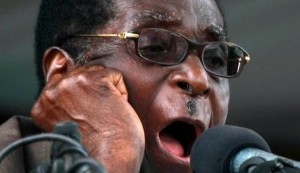The irony was not lost to many especially his close allies who were evidently uneasy about what sounded way too absurd.
There was a man whose government presides over run down and poorly resourced hospitals which have been labelled more of death centres than places where good health must ordinarily be restored.
The temerity to fly a family member to a better resourced Singaporean hospital was baffling, to say the least.
And to add insult to injury, Zimbabweans were told that the doctors in Singapore were actually familiar with Bona and the first family hence the need to seek their services.
While the Mugabes can behave that way with little consequence, the question is; why would the rest of Zimbabweans accept what is evidently unethical leadership?
According to a leading Czech scholar, Ken Peters, the problem has not been the leaders that we have chosen. He puts the fault squarely on the Zimbabwean people. He says we are the authors of our own demise.
In his own words he says, “The danger to Zimbabwe is not Robert Mugabe, but a citizenry capable of entrusting a man like him with the Presidency. It will be far easier to limit and undo the follies of a Mugabe presidency than to restore the necessary common sense and good judgement to a depraved electorate, willing to have such a man for their president. The problem is much deeper and far more serious than Mr Mugabe, who is a mere symptom of what ails Zimbabwe. Blaming the prince of the fools should not blind anyone to the vast confederacy of fools that made him their prince. Zimbabwe can survive a Robert Mugabe who is, after all, merely a fool. It is less likely to survive a multitude of fools such as those who made him their President.”
Zimbabwe, the way we choose our leaders has been premised on a flawed process of individualising the state and its relationship with the people.
In other words, our method of choosing our leaders has been largely unethical. Despite knowing the apparent flaws of our prospective leaders, we have deliberately put the same individuals on a pedestal, above the state.
When President Mugabe, then Prime Minister of a newly independent Zimbabwe declared he wanted a one party state in Zimbabwe, there was a stampede by his cabinet ministers to ensure the now defunct Lancaster House Constitution was amended to give him sweeping Executive powers.
The political culture that developed since then saw the state president in fact grow bigger than the State itself. Since that time, we have had a dogmatic political culture where grown up men around him have made him a demigod, grovelling before him at every instance.
This lack of ethical leadership among the politicians of Zimbabwe has influenced our political culture to a great extent.
Firebrand politician and former Member of Parliament for Sunningdale, Margaret Dongo pointed this out very early in the political life of Zimbabwe by calling Zimbabwean politicians who were too coy to challenge President Mugabe’s excesses as “Mugabe wivesâ€.
So when Ken Peters refers to Mugabe as merely symptomatic of a much deeper problem, he means the institutionalised unethical political culture where leaders have ceased to be accountable to the people they lead. In fact, the people are now beholden to the leadership for their survival.
Ethical leadership the world over is premised on a political culture that builds strong institutions were individual interest can never ever take precedence over those of state institutions.
In Zimbabwe, the Constitution is the supreme law. No individual or group of individuals should be allowed to make decisions that override the Constitutions of the State.
Zimbabwe, we need to retrace our footsteps and find out where we went wrong. As the American President, Theodore Roosevelt once said, “Patriotism means to stand by the country. It does not mean to stand by the President or any other public official save exactly to the degree in which he himself stands by the country. It is patriotic to support him in so far as he efficiently serves the country. It is unpatriotic not to oppose him to the exact extent that by inefficiency or otherwise he fails in his duty to stand by the country.â€
Lloyd Msipa is a United Kingdom based Zimbabwean with a keen interest on what is happening in Zimbabwe. He writes in his personal capacity.
Post published in: Featured


